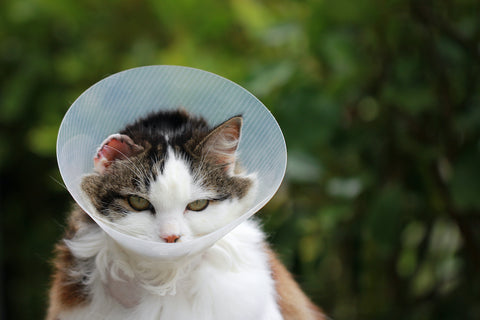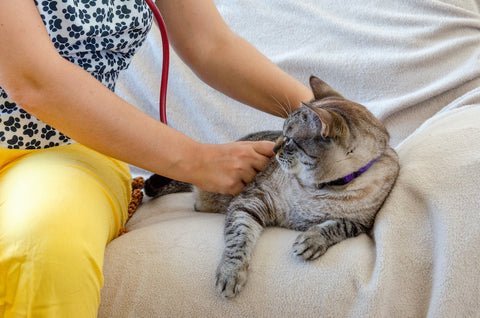Skin Cancer in Cats: Causes, Prevention, and Treatment
Cancer is a devastating diagnosis for both humans and animals, and cats are no exception. Our feline companions, known for their grace and independence, can also be susceptible to various forms of cancer. While the word "cancer" can be terrifying, it's important to remember that early detection and appropriate treatment can greatly improve a cat's prognosis.
In this article, we will explore the types of cancer that affect cats, their causes, symptoms, and potential treatment options.
Understanding Cat Cancer: Types, Causes, and Symptoms
Types of Cancer in Cats
Lymphoma: Lymphoma is one of the most common cancers in cats. It affects the lymphatic system, which plays a crucial role in the immune system. Cats with lymphoma may experience swelling in their lymph nodes, loss of appetite, weight loss, and vomiting.
Squamous Cell Carcinoma: This type of cancer primarily affects the skin, especially around the ears and nose. It is often linked to sun exposure, making it more common in cats with light-colored fur.
Fibrosarcoma: Fibrosarcoma is a type of soft tissue cancer that can develop at the site of a previous injection, such as a vaccine or medication. This is why it's essential for veterinarians to administer injections in specific areas, minimizing the risk.
Mammary Gland Tumors: Mammary gland tumors are common in unspayed female cats. Spaying your cat before her first heat cycle significantly reduces the risk of developing this type of cancer.
Oral Cancer: Cats can develop cancer in their mouths, including squamous cell carcinoma and fibrosarcoma. Symptoms may include difficulty eating, drooling, and bad breath.

Causes of Cancer in Cats
The exact causes of cancer in cats are not always clear, but several factors can increase the risk:
Genetics: Certain breeds are more predisposed to specific types of cancer. For example, Siamese cats are at a higher risk of developing mammary gland tumors.
Age: Just like in humans, the risk of cancer increases as cats age. Regular veterinary check-ups become even more crucial for older cats.
Environmental Factors: Exposure to environmental toxins, such as secondhand smoke and pesticides, can increase the risk of cancer.
Viruses: Some viruses, like the feline leukemia virus (FeLV) and feline immunodeficiency virus (FIV), can weaken a cat's immune system and increase susceptibility to cancer.
Signs and Symptoms
Cats are masters at hiding their pain and discomfort, so it's essential for cat owners to be vigilant and look for signs that may indicate cancer:
Unexplained Weight Loss: Sudden or significant weight loss without a change in diet or activity level can be a red flag.
Lethargy: If your normally active cat becomes lethargic and disinterested in play or social interaction, it could be a sign of illness.
Changes in Appetite: A sudden loss of appetite or difficulty eating can be indicative of oral or digestive system cancers.
Swelling: Swollen lymph nodes, lumps, or bumps on the skin should be promptly examined by a veterinarian.
Changes in Behavior: Cats may become irritable or hide more often when they are unwell.
Diagnosis and Treatment
If you suspect that your cat may have cancer, it is crucial to seek prompt veterinary care. The diagnosis typically involves a combination of physical examinations, blood tests, imaging (X-rays, ultrasound), and biopsies. Once diagnosed, treatment options may include:Surgery: Surgical removal of the tumor is often the first line of treatment when feasible.
Chemotherapy: Chemotherapy can help shrink tumors and slow down cancer progression.
Radiation Therapy: Radiation therapy is commonly used for cancers that cannot be surgically removed or for palliative care.
Pain Management: Managing pain and maintaining a good quality of life for your cat is essential.
Dietary Changes: Specialized diets may be recommended to support your cat's nutritional needs during treatment.
Supporting Your Cat During Cancer Treatment
Emotional Support: Cats can become stressed during medical procedures and treatments. Provide comfort and reassurance through familiar objects, such as their favorite blankets or toys. Spend quality time with your cat to reduce anxiety.
Medication Compliance: If your cat is prescribed medication, ensure you administer it as directed by your veterinarian. Consistency is crucial for the effectiveness of treatment.
Diet and Nutrition: Consult with your veterinarian about the most appropriate diet for your cat during and after cancer treatment. Proper nutrition is essential for maintaining strength and a healthy immune system.
Hydration: Ensure your cat stays well-hydrated. If they are reluctant to drink water, consider wet food or adding water to dry kibble to increase fluid intake.
Regular Vet Check-ups: Continue regular check-ups with your veterinarian even after treatment is completed. Monitoring your cat's health is crucial to catch any potential recurrences early.
Life After Cancer Treatment
Quality of Life: Focus on ensuring your cat's overall quality of life. Engage in play, provide a comfortable and safe environment, and offer plenty of affection.
Monitor for Recurrence: Keep an eye on your cat for any signs of recurrence or new symptoms. Early detection can significantly improve the chances of successful treatment.
Supportive Care: Some cats may experience long-term side effects from cancer treatment. Work with your veterinarian to manage any ongoing health issues, such as pain or gastrointestinal problems.

Preventive Measures
Spaying and Neutering: Spaying female cats before their first heat cycle and neutering male cats can reduce the risk of certain cancers, such as mammary gland tumors and testicular cancer.
Limit Sun Exposure: If you have a cat with light-colored fur, consider limiting their exposure to direct sunlight to reduce the risk of skin cancer. You can do this by providing shade and keeping them indoors during peak sun hours.
Minimize Environmental Toxins: Be cautious about exposing your cat to potential environmental toxins, such as tobacco smoke, household chemicals, and pesticides. Keep your home safe for your feline friend.
Vaccinations: Keep your cat up-to-date on vaccinations, including those for feline leukemia and feline immunodeficiency virus, to reduce the risk of associated cancers.
Regular Check-ups: Schedule routine veterinary check-ups to catch any health issues early and discuss preventive measures with your veterinarian.
In conclusion, while a cancer diagnosis in your cat can be distressing, there are steps you can take to support their well-being and improve their chances of recovery. Early detection, proper treatment, and ongoing care are essential in the fight against cancer. Always consult with your veterinarian for personalized guidance and treatment options tailored to your cat's specific needs.
With love, attention, and the right care, many cats can overcome cancer and enjoy a good quality of life.
Leave a comment
